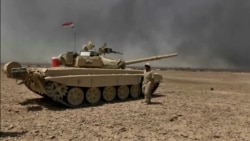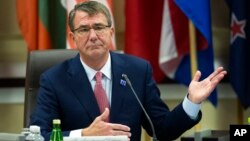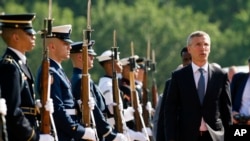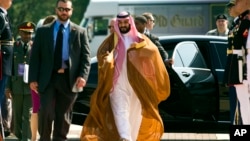Defense ministers from more than 30 countries have reviewed and agreed upon the next steps for taking on the Islamic State terror group in its final strongholds.
Following the counter-Islamic State meeting Wednesday at Joint Base Andrews outside Washington, U.S. Defense Secretary Ash Carter said the coalition’s next moves would culminate in seizing control of Mosul, the major IS hub in Iraq, and Raqqa, the terror group’s self-proclaimed capital in Syria.
Officials said Carter used the meeting to determine strategies to accelerate the campaign in Iraq and Syria, especially now that the Iraqis are setting up their push to retake Mosul, the largest Iraqi city controlled by the terror group.
"With respect to Mosul, we shouldn't underestimate the amount of preparation necessary to take on an operation like that,” said General Joseph Votel, head of U.S. Central Command, which overseas military operations in the Middle East.
Contributions
Last week, the United States committed an additional 560 troops to help shape the fight for Mosul, and Carter announced after the meeting that other countries in the room had indicated their intent to contribute additional requirements to help the battle against IS succeed.
“It was very encouraging to see so many countries be willing to do so much more across such a wide spectrum of capabilities,” Carter said, pointing to new coalition commitments ranging from providing strike aircraft to conducting training and stabilization efforts.
A second counter-IS meeting of both foreign ministers and defense ministers will be held Thursday at the U.S. State Department. Officials said leaders would concentrate on "what comes after" battles are won, so that peace and stability can follow the fights.
"The biggest strategic concern of this group of defense ministers was that the stabilization and governance efforts will lag behind the military campaign,” Carter said. “Making sure there's no such lag must be a significant strategic priority for us."
U.S. Secretary of State John Kerry hosted a fundraising conference Wednesday at the State Department to try to raise at least $2 billion for Iraq as it retakes territory from the terror organization.
Kerry said that in order to eliminate the group from Iraq, “the government in Baghdad has got to be viewed as responsive to the needs of the people in all parts of the country, regardless of tribe, regardless of ethnicity, regardless of creed."
The coalition has established an "immediate stabilization" fund, which officials say contains about $100 million at any given time.
"This is kind of to get the lights on, to get police trained, to get them back in the streets, to allow people to return to their homes," Brett McGurk, special presidential envoy to the Coalition to Counter Islamic State, told reporters Tuesday. He highlighted the city of Tikrit as an example of the stabilization effort's success.
Nearly the entire Tikrit population has returned to the city since it was liberated last year — and overall in Iraq, more than 700,000 Iraqis have returned to their homes in areas that IS used to control, according to McGurk.
Diaspora IS fighters
The coalition also must worry about the large numbers of Islamic State fighters likely to disperse after the so-called caliphate is destroyed in Iraq and Syria.
"This isn't going to be some kind of absolute victory. Nobody's going to sign a surrender document," Anthony Cordesman, the Burke Chair in Strategy at the Center for Strategic and International Studies, told VOA.
The leaders at the counter-IS meeting extended their focus to Islamic State networks outside Iraq and Syria. IS has about eight self-declared affiliates around the world, from Afghanistan to Libya.
Cordesman cautioned that the rising threat against global society, however, was bigger than IS. Lone wolf attacks were the cause of nearly 50 deaths in Orlando, Florida, and more than 80 were killed in such attacks in Nice, France.
"We can't afford to become obsessed with an acronym. The broader threat of Islamic extremism has not diminished," said Cordesman.
Turkey turmoil
One noticeable absence from the meetings is Turkish Minister of Defense Fikri Isik. Turkey's ambassador to the United States is representing Ankara instead as the country deals with the aftermath of a coup attempt carried out last week by elements within the military.
Carter said he spoke with Isik by phone Tuesday and reiterated U.S. support for Turkey's democratically elected civilian government. He said Isik assured him that Turkey remains a determined and committed partner in the fight against Islamic State.
Turkey is home to Incirlik Air Base, which houses U.S. refueling aircraft and attack aircraft used in the counter-IS fight. More than 3,000 U.S. personnel are based in the country as well.








